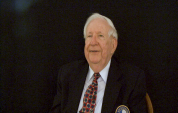5:35 | After being drafted in 1942, Bob Spooner went to basic training at Fort McClellan in Alabama. The men from up north were having a tough time of it in that hot Alabama sun, he recalls. After a queasy voyage with terrible food, he underwent a long period of training in England, preparing for the big invasion.
Keywords : Bob Spooner Fort McClellan Anniston AL Alabama Camp Kilmer passport 29th Infantry Division RMS Queen Mary RMS Empress of Scotland seasick Firth of Clyde Scotland Tidworth England amphibious English Channel

He wasn't told much about the mission while he was training in England, but Bob Spooner knew exactly what he was in for. He wound up as company clerk when his commander found out he could type. Then he was given the unusual role of casualty reporting. Once he was ashore after D-Day, that job proved difficult.
I'd rather not be here. That was Bob Spooner's thought as he headed for the beach on D-Day. But in he went and did his best. He had the unusual job of reporting battle casualties and he saw plenty before he could even get to work.
As Bob Spooner's unit began moving from the beach into the French countryside, they accepted the surprise surrender of some unenthusiastic Germans. He was tasked with reporting battle casualties and he had a lot of work after the battles of Saint-Lo and Brest.
Moving into Belgium via train, Bob Spooner's food got an upgrade when a boxcar full of m-rations was located. His job of battle casualty reporting was made easier when he moved into the regimental headquarters and started compiling reports from multiple sources.
On New Year's Eve in 1944, Bob Spooner saw a display of tracers fired by both sides to celebrate the holiday. At war's end, he was in Bremerhaven and his next stop was home.